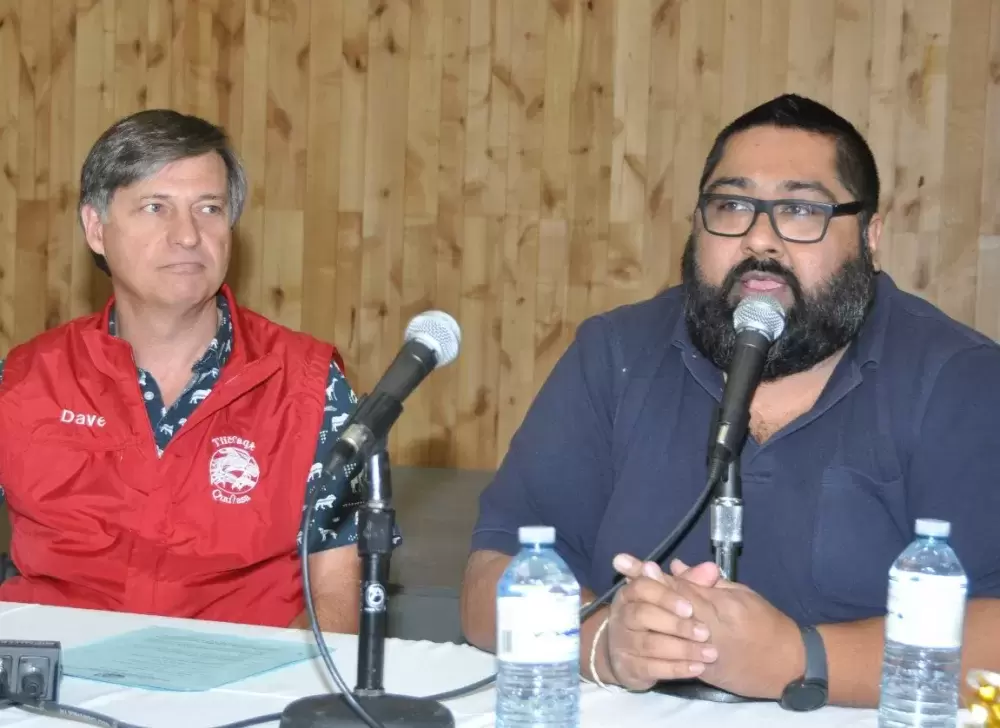Kim Rai, Quu’asa supervisor, and clinical counsellor Dave Zryd led off the speakers at DAC Health Ability Fair, held Nov. 3 with a short presentation on the Impact of Family Violence on Nuu-chah-nulth Nations, followed by an extended question and answer session.
Rai explained that the Teechuktl Mental Health program has clinical counsellors in each of the four regions.
“As well, we have cultural workers. We pride ourselves in being one of the first culturally-led clinical programs in Canada.” The Quu’asa counselling program was initially a “two-year-funded” program. It is now in its eighth year.
Dave Zryd prefaced his remarks by acknowledging that the Health Ability Fair focuses on people with disabilities. People with disabilities are that much more vulnerable to family violence, he noted.
“My job is to work with people who want to be in counselling,” Zryd said. “But they have to be ready to make the change. They may come to me through the Usma program; they may come to me through the probation program, or through family identification that this is an individual who needs some extra support.”
The goal, for the client, is to bring them to where they understand where the violence comes from, and how to get it under control, so they will no longer pose a threat to the family.
“Being in a family is one of the places where you hope you will be safe. That you come home at the end of the day and you will be treated with respect.”
Zryd said that, regrettably, every attendee in the hall has likely either experienced family violence or knows somebody who has.
Family violence is very much something that takes place behind closed doors, he explained.
“It’s a very private thing, and it takes a lot of strength for someone to come forward and say, ‘I have a problem, and I’d like to control my anger and to be on my best for my family. And I don’t want to have them be afraid of me anymore.”
That client must be willing to make a big change, and one of the main requirements is a willingness to give up that level of control that flows from violence. Because power-through-anger/violence is a behavior that is learned at an early age.
“Just like a little two-year-old, if we’re not getting our own way, we raise our voice, we throw a few things around, we have a temper tantrum. All of a sudden, we get our way,” Zryd said. “But when an adult throws a tantrum, people get hurt. Children get hurt, spouses get hurt.”
Zryd and Rai then opened up the discussion for questions. Some questioners brought specific situations, which the counsellors made a commitment to investigate and remedy.
Others were on a general basis. Such as, is there a limit to the number of counselling sessions available?
Answer: no. The service is ongoing and not limited. Many clients need up to a year of counselling.
For those who witness family violence, there is a tendency to act in a way you saw acted out in the family when you were a youth. Here, there is a need to break that cycle.
“Taking responsibility is a big step,” Rai said.
On the topic of elder abuse, Rai noted that for Nuu-chah-nulth-aht, living in extended families was once the rule. But that has shifted. Now many seniors live in care.
Elder abuse extends well beyond overt violence, he explained. Late meals, withholding information, control issues all fall under the heading of elder abuse.
“Part of the key is to encourage that elder to take a leading role in the family,” he said.
One question became a subject for future discussion and development: the need for a ceremony to honour and recognize the children who survive witnessing family violence.
And yes, Quu’asa teams do visit schools in the four, by request. These are arranged by the Nuu-chah-nulth Education Department.







